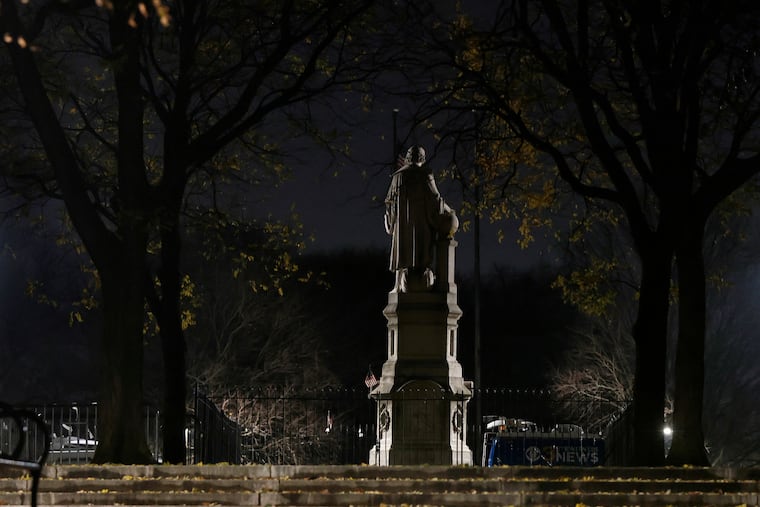Philly Columbus statue defenders sue Mayor Kenney, city officials over removal controversy
The Italian American group Friends of Marconi Plaza filed a lawsuit against Philadelphia Mayor Jim Kenney and city officials over the proposed removal of a Christopher Columbus statue.

The group that fought to preserve the Christopher Columbus statue in South Philadelphia is suing Mayor Jim Kenney and members of the city’s Historical Commission for their roles in the yearslong fight over attempts to remove it.
The Friends of Marconi Plaza allege in the complaint filed last week that the city officials conspired to abuse the legal process by attempting to remove the statue from its current location in Marconi Plaza after it became the site of tense standoffs in 2020.
Robert Thomas, chair of the Historical Commission, and three other commission members are named in addition to Kenney.
The 146-year-old statue of the controversial Italian explorer became a lightning rod that summer amid national demonstrations over racial injustice.
As activists pressured cities to review polarizing landmarks related to slavery and colonialism, crowds of people gathered to defend the Columbus statue — including some wielding baseball bats and firearms — and brawled with protesters.
The Kenney administration then requested a review of the statue for possible removal, citing Columbus’ well-documented enslavement of Indigenous people during his visits to North America in the late 1400s.
Historical Commission members voted for its removal, though they soon faced a lawsuit from Friends of Marconi Plaza. A plywood box was erected around the figure as legal challenges mounted, and was removed late last year after a court order.
The statue remains visible today.
George Bochetto, the lead lawyer for Friends of Marconi Plaza, said there are no known plans for its future removal. Instead, Bochetto told The Inquirer the latest suit is about what he sees as holding government officials accountable.
“Frankly, it’s shocking what took place here, and it’s a shocking disregard for their responsibilities,” Bochetto said.
A spokesperson for Kenney’s office declined to comment on the litigation.
Kenney’s administration had expressed its disappointment with the unboxing in December, doubling down on its assertion that the statue should be removed.
Throughout their 28-page lawsuit, the Friends of Marconi Plaza bring a range of allegations, suggesting that officials conspired to abuse the legal system by holding “sham hearings” as they proposed the statue’s removal.
Those hearings, which lasted 28 days, failed to offer a full 90-day period for public comment that is called for under city law, the lawsuit alleges. The move deprived “citizens of their ability and right to provide meaningful input,” it says.
In addition, the suit alleges that the lengthy legal squabble has robbed the Friends of Marconi Plaza, a nonprofit, of its ability to fundraise and has damaged its reputation.
It claims that the city made a “decision to target” the statues’ defenders due to their Italian American heritage, leading to emotional damages.
More than $50,000 is sought for each of four separate counts. In addition, Bochetto said he’d like to see the named officials resign.
The suit comes after Bochetto’s firm recently filed an appeal petition to the U.S. Supreme Court that it hear a separate case against Kenney and the city, involving its 2021 decision to rename Columbus Day as Indigenous People’s Day.
More than 10,000 such petitions on a range of topics are filed with the Supreme Court per term, according to the court. About 80 make their way to oral argument before the justices.
Meanwhile, any other changes for the statue under Kenney remain unclear as the city prepares for a new administration to begin in January 2024.
A city spokesperson told reporters in December that it would “continue to explore our options for a way forward that allows Philadelphians to celebrate their heritage and culture while respecting the histories and circumstances of everyone’s different backgrounds.”
One suggestion, offered by the Commonwealth Court judge who presided over the unboxing case, was that the administration add a plaque that closer aligns with the city’s message.